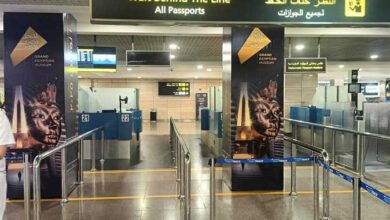Students, academics and intellectuals are celebrating a recent court ruling barring security personnel from university campuses, but concerns about its enforcement remain.
"The presence of permanent Interior Ministry police forces inside university campuses represents a violation of the independence guaranteed to the university by the Constitution and the law," read the Saturday court ruling.
The High Administrative Court upheld a previous court ruling ordering Ministry of Interior affiliated security guards to vacate the Cairo University premises. The suit was filed by a group of Cairo University professors in 2008.
The ruling comes during an academic year that has witnessed a crackdown by university officials, in cooperation with police guards, against students affiliated with the political opposition. Analysts argue that this crackdown indicates the determination of the regime to suppress dissent ahead of the upcoming parliamentary elections.
"All the time there have been administrative violations against students such as searching them at the gates, putting them before disciplinary boards, or preventing them from attending exams," said Cairo University academic Kholoud Saber. "This academic year, administrative violations against students have been extraordinary."
Those violations include an alarming number of students transferred to the prosecution office before undergoing trial, Saber added.
Nine students who staged a demonstration to protest alleged violations against Somayya Ashraf, a student affiliated with the Muslim Brotherhood at the Al-Azhar University branch in Zaqazeeq allegedly physically assaulted by a university security guard in early October, are currently awaiting trial in custody.
Saber accused Ain Shams University officials of threatening the families of politically involved students.
Security have also barred policitally active students' access to university dormitories, particularly in Cairo, according to student accounts.
The ruling also comes less than a week after controversial student union elections which were reportedly marred by violations against opposition students.
According to Hassan Nafaa, professor of political science at Cairo University and the general coordinator of the reform group, the National Association for Change, students’ union elections indicate how the university is managed by the Ministry of Interior.
"Look at the student elections," Nafaa said. "It is not university presidents who remove students from electoral lists. State Security does all the work."
Lawyer Fatma Serag of the Association for Freedom of Thought and Expression, an NGO advocating for student rights, said security perceive students as troublesome political agents.
"They know that students have a political role," said Serag. "Students, for example, are really active in collecting signatures for the seven-demand reform program [launched by the NAC]."
Prime Minister Ahmed Nazif on Sunday said measures are intended to “protect the safety of both students and professors on campus.”
Criticism against security differs from one university campus to another. "It depends on the university itself as well as the year in question," said Saber.
However, governorates-based universities have an increased share in police brutality against students since those universities don’t attract much attention from the media and civil society. “Such [lack of attention] gives police guards a free hand in managing university campuses as they wish," said Serag.
According to Saber, universities in Cairo and Alexandria have more students supporting the opposition groups 6 April Youth Movement and the NAC, which translates into a heightened security presence.
Students affiliated with the Muslim Brotherhood, however, constitute the biggest opposition voice on public university campuses. They dominate the whole scene in governorates-based universities, according to Mohammed Elkassas, a political activist affiliated with the Muslim Brotherhood.
For the last ten years, according to Elkassas, students affiliated with the group have been subjected to police intimidation and harassment.
"Despite being the biggest opposition group on campus, the last Brotherhood representative in the student union of Cairo University was in 2001," Elkassas said.
Serag echoed those remarks. "The most affected group in terms of being a target to the police is the Muslim Brotherhood," he said. "However, this doesn't mean that liberal or leftist students are in a safe haven from the brutality of the police."
Observers, academics and students view the presence of university security guards as a main violation of university independence.
According to Elkassas, regulations dating to 1979 indicate that security should be present to protect university buildings. President Anwar Sadat issued in 1979 new regulations for universities in which he ordered the police to guard campuses. But the role of security has extended substantially from that initial mandate.
"Security has the upper hand in determining what's legal and what’s not legal, according to their views," said Elkassas. "They transformed the role of the university. University has become a branch of the Ministry of Interior."




